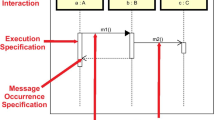Abstract
One of the most crucial and complex steps of object-oriented system design lies in the transition needed to go from system behavior (defined by means of scenario models) to component behavior (described by means of communicating hierarchical state machine models).This paper presents a re-verse approach for generating hierarchical UML statechart diagrams. Firstly, we put forward a generation algorithm for a flat statechart diagram based on the BK-algorithm, which is validated useful in our reverse engineering tool XDRE by generating UML statechart diagrams from a set of UML sequence diagrams. Secondly, according to UML composite state, an automatic approach of introducing hierarchy to the generated flat statechart diagrams is proposed and implemented. Finally, systematic experiment is conducted in the paper in order to verify the validity of this approach.
Preview
Unable to display preview. Download preview PDF.
Similar content being viewed by others
References
Biermann, A.W., Krishnaswamy, R.: Constructing Programs from Example Computations. IEEE Trans. Software Engineering 2, 141–153 (1976)
Booch, G., Jacobson, I., Rumbaugh, J.: The Unified Modeling Language User Guide. Addison Wesley, Reading (1999)
Harel, D.: Statecharts: A Visual Formalism for Complex System. Science of Computer Programming 8, 231–274 (1987)
Qingshan, L., Ping, C.: XDRE 2.0 Reference Manual Software Engineering Institute. Xidian University (2004)
Hua, C., Ping, C.: A Method of Designing Software Architecture Based on Process Group Component Model. Computer Science 31, 118–119, 137 (2004)
Whittle, J., Schumann, J.: Generating Statechart Designs from Scenarios. In: Proceedings of the 22rd International Conference on Software Engineering, pp. 314–323. IEEE Computer Society, Los Alamitos (2000)
Erkki, M., Tarja, S.: MAS-an Interactive Synthesizer to Support Behavioral Modeling in UML. In: Proceedings of the 23rd International Conference on Software Engineering, pp. 15–24. IEEE Computer Society, Los Alamitos (2001)
Qingshan, L., Ping, C., Wei, W.: A C++ Instrumental Mechanism based on Reflection and Open Compile. Systems Engineering and Electronics 25, 851–855 (2003)
Author information
Authors and Affiliations
Editor information
Editors and Affiliations
Rights and permissions
Copyright information
© 2006 Springer-Verlag Berlin Heidelberg
About this paper
Cite this paper
Chu, H., Li, Q., Hu, S., Chen, P. (2006). An Approach for Reversely Generating Hierarchical UML Statechart Diagrams. In: Wang, L., Jiao, L., Shi, G., Li, X., Liu, J. (eds) Fuzzy Systems and Knowledge Discovery. FSKD 2006. Lecture Notes in Computer Science(), vol 4223. Springer, Berlin, Heidelberg. https://doi.org/10.1007/11881599_50
Download citation
DOI: https://doi.org/10.1007/11881599_50
Publisher Name: Springer, Berlin, Heidelberg
Print ISBN: 978-3-540-45916-3
Online ISBN: 978-3-540-45917-0
eBook Packages: Computer ScienceComputer Science (R0)




